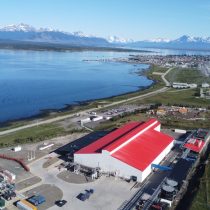
After completing 12 months of joining the Clean Production Agreement (CPA), Australis Seafoods, a salmon farming company present in the regions of Araucanía, Los Ríos, Los Lagos, Aysén and Magallanes, highlights the results that have been obtained since the pact led by Salmón Chile began.
One of these is the development and implementation of a standard for carbon footprint and corporate water footprint, which will allow the development of the mitigation and compensation strategy for greenhouse gases, among others.
María Paz Rojas, in charge of Sustainability of the company, explains that this agreement has challenging commitments which “can only be achieved jointly with the industry and suppliers.”
In turn, he adds that “it is important to acquire solid commitments that are measured by third parties demonstrating real progress that avoids greenwashing.”
The APL commits its associates with 60 actions that must be implemented within 24 months, by 260 production centers, food plants, laboratories, suppliers of different services, among others.
Among the general actions, there are the elaboration and implementation of a standard for the carbon footprint and responsible management of waste through a roadmap. With this, the purpose is to increase the rate of recovery of the main inorganic waste and sludge, as well as to implement sustainability projects and generate environmental awareness with the different communities and collaborators.
The general manager of the Salmon Technological Institute (Intesal), Esteban Ramírez, explained that “within the objectives of the agreement is to measure the carbon footprint and the preparation of the first water footprint standard to build waste reduction routes from there. These are part of the initial goals of the agreement and what companies build by being part of it.”
From Greenticket, an environmental consultancy that is facilitating the APL process through Salmón Chile, one of its managing partners, Nicolás Benko, said that the APL seeks to improve a problem that is climate change and the circular economy “in order for companies to take charge of those actions that can reduce greenhouse gas emissions, improve production processes and get fossil fuels out.”
In addition, he argues that they must also “begin to see how we design the bases or eco-design new products and services that do not emit or generate waste.”
In this line, environmental awareness to communities and collaborators is one of the actions that Australis is most proud of since, as the professional in the area explains, “for the company, to be sustainable, we must educate the most important capital, its collaborators”. In this line, he adds “we have made field trips with collaborators to learn about the biodiversity of our territories, awareness talks, among others.”
Esteban Ramírez emphasizes that “the union that monitors the goals is also responsible for reporting progress to the Agency for Sustainability and Climate Change (ASCC), taking action if some of the goals are not met and in general taking all the administration of the agreement.”
“To achieve such varied objectives is that we work with Greenticket as a specialized consultant and Intesal as counterpart and technical coordinator. Being the project area of SalmonChile where the management of the agreement is located, “he adds.
Likewise, the voluntary adoption of measurement schemes, the generation of homogeneous emissions reports, permanent surveys, among others, are part of the more than 60 actions included in the agreement to which 22 salmon producing companies and their supply chain subscribed, to reduce the environmental gaps of the industry.
Australis Seafoods has been responsible for aligning its sustainability strategy to the standards of this agreement, as well as to the different certifications associated with the subject, where in addition to the implementation of fingerprint measurement, it will be implementing field trips, learning workshops, conversations with experts, among others.
María Paz Rojas concludes that they are “part of a territory that works as a whole and we must get involved both with the environment and with the communities with which we coexist, so this APL motivates us and drives us to improve our way of doing things and integrate sustainable development.enible in every action we take.”
Follow us on
"El reclamo puede ser genuino, pero construido sobre una mentira", apuntó el presidente Javier Milei…
El gobernador de la provincia de Buenos Aires, Axel Kicillof, encabezó un acto en Ensenada…
El diputado nacional de La Libertad Avanza, José Luis Espert, expresó su confianza en la…
Tras la masiva reaparición de Cristina Fernández de Kirchner, el presidente Javier Milei apuntó contra…
El principal propósito de la nueva comisión es evaluar los recursos humanos en el Senado,…
En una medida que busca redefinir las condiciones de los seguros de automóviles en Argentina,…
Esta web usa cookies.